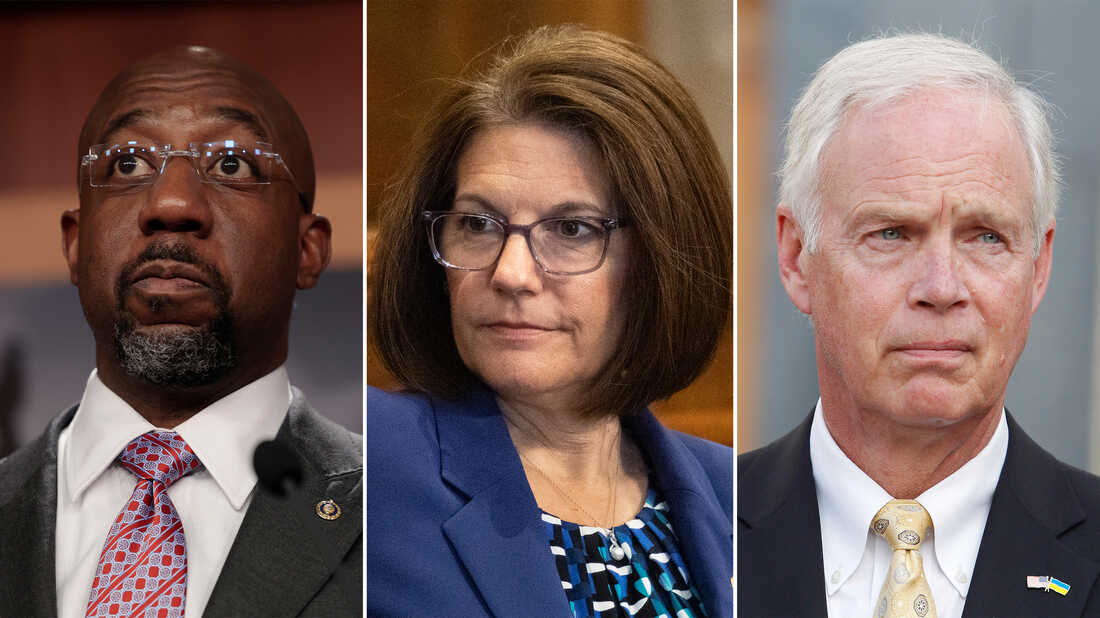Top 10 U.S. Senate races that are most likely to flip : NPR

Incumbent Sens. (from left) Raphael Warnock, D-Ga., Catherine Cortez Masto, D-Nev., and Ron Johnson, R-Wis., are all facing tough reelection contests this year.
Anna Moneymaker/Getty Images; Caroline Brehman/CQ-Roll Call, Inc/Getty Images; STR/NurPhoto/Getty Images
hide caption
toggle caption
Anna Moneymaker/Getty Images; Caroline Brehman/CQ-Roll Call, Inc/Getty Images; STR/NurPhoto/Getty Images

Incumbent Sens. (from left) Raphael Warnock, D-Ga., Catherine Cortez Masto, D-Nev., and Ron Johnson, R-Wis., are all facing tough reelection contests this year.
Anna Moneymaker/Getty Images; Caroline Brehman/CQ-Roll Call, Inc/Getty Images; STR/NurPhoto/Getty Images
The landscape has shifted.
When President Biden took office, it was widely believed that Republicans had a strong chance of taking back the House but, thanks to a friendly map for Democrats, the Senate was more competitive.
It was possible, if not likely, that Democrats — who control the Senate, which is split 50-50 — would retain the upper chamber and maybe even pick up a seat or two.
That is not the thinking now. With Biden’s struggling approval ratings in states across the country and high inflation a top concern for voters, Republicans have significantly improved their likelihood to take control of the Senate, based on conversations with operatives and strategists in both parties.
Unlike in the House, when all 435 seats come up for election every two years, only a third of Senate seats do. (Senators serve six-year terms.)
Of the 14 Democratic seats up this cycle, Biden won all of those states in the 2020 presidential election. In contrast, 21 Republican-held seats are up and Biden won in two of those states – Pennsylvania and Wisconsin. But overall, several of the states up for grabs were very close in 2020, and the slightest push in the GOP’s direction could tip the balance.
As it is, Republicans have an advantage this year because traditionally midterm elections are lower-turnout affairs and the party out of power is able to more easily turn out its base, angry with the president. The Senate is less subjected to dramatic shifts, as compared to the House, but the party out of power in a president’s first midterm has still won a net gain of two seats on average in the Senate since 1950.
With that background in mind, here is the first NPR Top 10 Senate seats most likely to change hands in 2022.
The analysis is based on reporting in the field, conversations with Democratic and Republican operatives and strategists, as well as publicly available data, such as ad spending and polling. We will update this periodically through Election Day.
1. Pennsylvania (R-Open)

Pennsylvania Lt. Gov. John Fetterman, center, and his Democratic Senate primary rival Rep. Conor Lamb wait as President Biden prepares to speak about the economy in Pittsburgh on Jan. 28.
Saul Loeb/AFP via Getty Images
hide caption
toggle caption
Saul Loeb/AFP via Getty Images
The top of this top 10 is difficult, but an open seat in a state Biden won, where Republicans are facing a messy primary, is a place to start. This seat opened up when Republican Sen. Pat Toomey announced he would not run for reelection.
Lt. Gov. John Fetterman has a big lead in the Democratic primary and is raising lots of money while Republicans have spent millions against each other. This is the Democrats’ top target. With Wisconsin, they are two critical places for Democrats to try and hold the Senate. But they are facing stiff headwinds, however, as only about a third of Pennsylvania voters say they approve of the job Biden’s doing.
Former President Donald Trump stepped into the Republican primary fight over the weekend between David McCormick, a former hedge fund manager, and TV’s Dr. Mehmet Oz, who faced controversy over his residency because he had been seen often at his home in New Jersey. Trump picked Oz, despite McCormick traveling to Mar-a-Lago recently in search of Trump’s support and being married to a former top Trump aide. Privately, Republicans say they would be happy with either candidate, but that McCormick is viewed as the more mainstream conservative. Both candidates are very wealthy. They have already spent tens of millions of dollars, as have outside groups, and this is expected to be one of the most expensive races in the country.
2. Georgia (D-Warnock)

Georgia Democratic Sen. Raphael Warnock speaks at a news conference on Jan. 4 in Washington, D.C.
Anna Moneymaker/Getty Images
hide caption
toggle caption
Anna Moneymaker/Getty Images
Democratic incumbent Raphael Warnock is running for his first full term after winning a special election last year. Georgia has seen lots of close and heated political fights in the last few years as the Sun Belt continues to change demographically. In a surprise, Biden won Georgia, but only by fewer than 12,000 votes out of almost 5 million. Notably, Warnock, the former pastor at Ebenezer Baptist Church, won his special election over former Sen. Kelly Loeffler by a wider margin. But Biden’s approval has taken a nosedive in the state, with only about a third saying they approve of the job he’s doing.
The leading Republican in the race is former NFL running back Herschel Walker. Walker, a former Heisman-winning University of Georgia Bulldog who has Trump’s endorsement, may have high name identification in the state, but he’s untested as a candidate. Walker has written about his battle with dissociative identity disorder and is facing allegations of domestic abuse from past relationships and that he exaggerated his post-football business success. So far, Warnock has the money advantage, raising $30 million to Walker’s $9 million, as of their last filings at the end of the year. Polls have had them neck and neck.
3. Nevada (D-Cortez-Masto)

Nevada Democratic Sen. Catherine Cortez Masto attends a Senate Energy and Natural Resources Committee hearing on May 27, 2021.
Caroline Brehman/CQ-Roll Call Inc. via Getty Images
hide caption
toggle caption
Caroline Brehman/CQ-Roll Call Inc. via Getty Images
This race doesn’t get as much attention as some of the others. Freshman incumbent Catherine Cortez-Masto has largely maintained a low profile in Washington.
But Republicans are more bullish about their chances here than in any other race. Nevada is one of those states that always seems to be close — Biden won it by just over 2 percentage points in 2020 and Cortez-Masto won it by a similar margin in 2016 when she had the benefit of presidential-year turnout. It’s also another state where Biden’s approval rating is underwater, and if Democratic base groups aren’t fired up — particularly Latino and Asian American voters in a state where they are key — that could make it difficult for Cortez-Masto.
Cortez-Masto has the money advantage over likely Republican nominee Adam Laxalt, the state’s former attorney general. And Democrats traditionally have a strong turnout operation in a state where most of the Democratic vote is concentrated in one place — Clark County (Las Vegas). With the passing of former Sen. Harry Reid, who is credited with building the ground game, there is an open question of how it will perform.
Trump endorsed…
Read More: Top 10 U.S. Senate races that are most likely to flip : NPR




